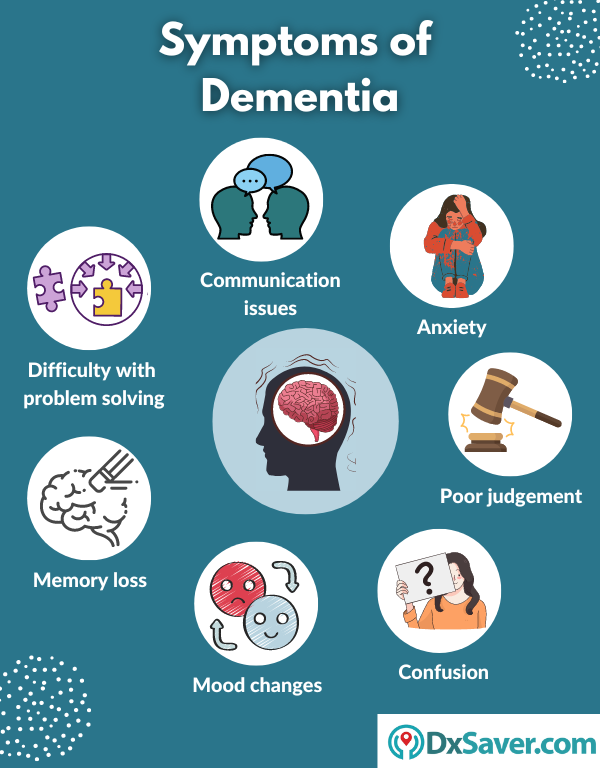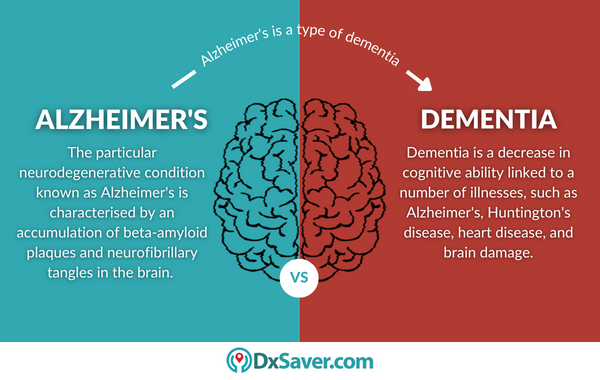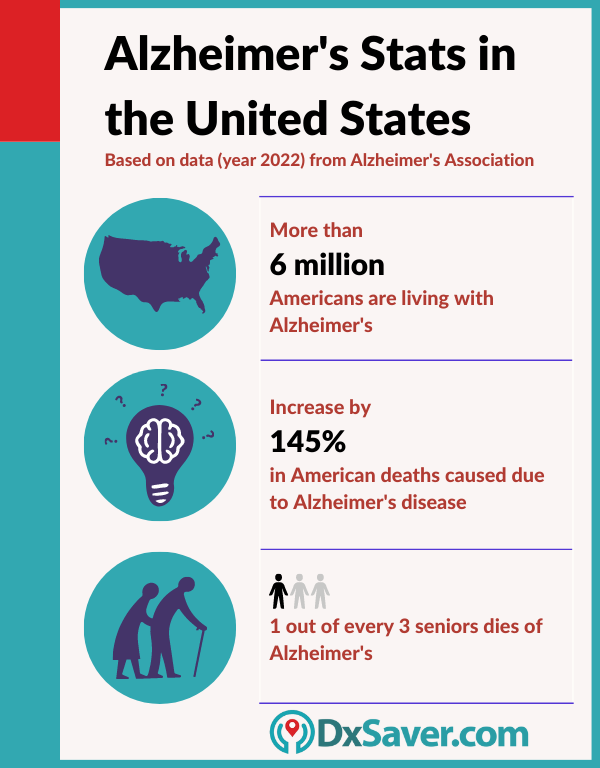
Each human cell has the instructions necessary to carry out its function. Deoxyribonucleic acid, or DNA, the material that makes up these instructions, is tightly coiled up into units known as chromosomes. Genes are the thousands of segments that make up each chromosome.
A person inherits their genes from their biological parents. They contain data that describes characteristics like eye color and height. Moreover, genes are involved in the health of the body’s cells.
Diseases like Alzheimer’s can be brought on by genetic issues, even by little gene mutations.
- What is APOE Gene?
- What are the types of APOE genes?
- What is the importance of the APOE gene?
- Relationship between the APOE gene, brain health, and mental wellness
- What is dementia?
- Does APOE gene type cause dementia?
- What is Alzheimer’s disease?
- What is the relationship between APOE and Alzheimers?
- Does the APOE gene cause heart disease or increase your cholesterol levels?
- Diagnosis: What is the APOE gene test?
- Why take the APOE gene test?
- What do the test results mean?
- Providers location
- FAQs
For our readers, who are more interested in knowing the APOE Gene test cost beforehand, we begin with that section.
How much does the APOE Gene test cost?
An APOE Gene test costs $199 in the U.S. The cost of an APOE Gene test also depends on your choice of visiting the nearest lab or getting tested at home using the APOE Gene home test kit. Complete the procedure and get the results in your email in 5 to 6 business days. Doctor consultation is also available for further treatment or any kind of medical advice.
The following table shows the APOE Gene home test kit cost by one of our partners located in the U.S.
Name of our Partner Lab | Book Online |
EmpowerDx Lab(Home Test Kit)
| Offer Price$99 |
What is the APOE gene?
The Apolipoprotein E genotype is the full name of the APOE gene. It instructs your body on how to produce the protein Apolipoprotein E (APOE). The APOE gene is the gene that delivers the necessary instructions for the production of the apolipoprotein E protein. The body produces lipoproteins when this protein mixes with lipids or fats. Cholesterol and other fats are carried through the circulation in a package by lipoproteins.
What are the types of APOE genes?
The APOE gene is known to be present in three different forms (alleles). The three primary alleles or variations are APOE2, APOE3, and APOE4. These variations have different genomic sequences, which affects the apoE protein’s structure and functionality.
The functionality of the three different variants and their impact on the human body are listed below:
- APOE2 Gene: The least frequent version is the APOE2 gene. This gene has been linked to a reduced risk of cardiovascular illness as well as Alzheimer’s disease. Moreover, such a variation type of ApoE gene research is related to increased lifespan and cognitive performance.
- APOE3 gene: The most prevalent APOE gene variation, APOE3, is regarded as the “neutral” version since it is not connected to an increased likelihood of Alzheimer’s disease or other diseases.
- APOE4 gene: The APOE4 variation has been attributed to an increased risk of Alzheimer’s disease (particularly in late-onset cases), a form of dementia that impairs memory and cognitive function.
One copy of the APOE4 allele increases the risk of Alzheimer’s disease in carriers by two to three times, whereas two copies (one from each parent) raise the risk by twelvefold. Moreover, APOE4 has been linked to a higher risk of cardiovascular disease and a worsened response to several drugs. Nevertheless, not everyone who has Alzheimer’s disease carries the APOE4 mutation, and not everyone who carries the APOE4 variant necessarily develops the illness.
What is the importance of the APOE gene?
Apolipoprotein E (apoE), a protein produced from the APOE gene, is crucial for lipid metabolism and is active in the transportation of lipids to and from the liver as well as the brain. In general, the APOE gene and the protein it produces are critical for preserving the well-being and functionality of numerous organs and tissues across the body.
APOE is essential for the preservation and restoration of neural connections and also in the removal of beta-amyloid. In this removal process, APOE2 gene variation performs the best, while APOE4 gene variation leads to beta-amyloid protein plaques that accumulate and contribute to the development of Alzheimer’s disease.
The APOE gene is essential for comprehending brain health and formulating plans for preserving mental health and cognitive function throughout life.
Relationship between the APOE gene, brain health, and mental wellness
For understanding brain health, a study on the APOE gene is crucial. This is because, in the brain, astrocytes and microglia to a certain degree are the main producers of apoE. ApoE, which makes up the majority of HDL (high-density lipoprotein) -like particles in the brain, aids in the movement of phospholipids and cholesterol across cells.
The APOE4 variation has been connected to brain inflammation and oxidative stress, which aids in the onset of Alzheimer’s disease. The brain’s capacity to eliminate beta-amyloid and other toxins could be hampered by the APOE4 allele.
Your depression and anxiety could be increased by the APOE gene. The APOE4 gene in particular is known to worsen depression because it could make our bodies respond badly to antidepressant medications. The apolipoprotein E (APOE) gene’s e4 alleles are linked to an increased risk of dementia and cognitive decline. However, It has also been found that APOE2 is related to lowering the possibility of anxiety.
What is dementia?
The word “dementia” is used to describe a collection of symptoms that significantly impair cognitive abilities – memory, reasoning, and social functioning – such that it interferes with a person’s everyday life and activities. Emotional unpredictability and changes in mood are observed in certain dementia patients.
The type of dementia are:
- Alzheimer’s disease: It is the most common dementia diagnosis in older persons. Alterations bring it on in the brain, such as aberrant protein accumulations called amyloid plaques and tau tangles.
- Frontotemporal dementia: This is a rare kind of dementia and usually affects adults under the age of 60. Unusual levels or types of the proteins tau and TDP-43 are linked to it.
- Lewy body dementia: This type of dementia is mainly caused by Lewy bodies, an aberrant buildup of the protein alpha-synuclein.
- Vascular dementia: This is brought on by illnesses that harm the brain’s blood vessels or obstruct the flow of blood and oxygen to the brain.
- Mixed dementia: A mixture of two or more kinds of dementia.
Signs of dementia are listed below:

Does APOE gene type cause dementia?
The APOE (apolipoprotein E) gene has been connected to an elevated risk of vascular dementia and Lewy body dementia, among other types of dementia.
Reduced blood supply to the brain, frequently as a result of a stroke or other cardiovascular illness, is what causes vascular dementia. The APOE4 mutation may facilitate the buildup of beta-amyloid plaques in the brain and impede the brain’s capacity to repair damaged blood vessels, both of which may contribute to the onset of vascular dementia.
The APOE4 variant has also been connected to an elevated risk of Lewy body dementia. Lewy bodies, which are aberrant protein deposits, build up in the brain and cause dementia. By encouraging the buildup of alpha-synuclein protein, another protein linked to the condition, the APOE4 mutation may aid in the onset of Lewy body dementia.
While a study on the APOE gene is crucial for understanding the genetics of dementia, it is not the only component that can lead to the condition. There may be other genetic and environmental variables at play. Nonetheless, research on the APOE gene is crucial for creating plans for guarding against and treating dementia.
What is Alzheimer’s disease?
Alzheimer’s disease has become the most widespread kind of dementia. It is a slowly progressing condition that at first causes little memory loss and may later result in loss of speech and awareness of one’s surroundings. Alzheimer’s disease affects the areas of the brain responsible for memory, cognition, and language.

What is the relationship between APOE and Alzheimers?
The most recognized genetic risk factor for late-onset Alzheimer’s disease is the APOE (apolipoprotein E) gene. Alzheimer’s cases that appear beyond age 65 are referred to as late-onset instances.
According to research, those who have one copy of the APOE4 variation of the APOE gene are more likely to acquire Alzheimer’s disease than those who do not. The danger is much greater for those who have two copies of the APOE4 variation. The reason for this increase in Alzheimer’s is that APOE4 encourages the development of beta-amyloid plaques in the brain, a characteristic aspect of the condition.
It’s crucial to remember that not all persons with Alzheimer’s disease carry the APOE4 variation, and possessing the variant does not guarantee that a person will get the illness.

Does the APOE gene cause heart disease or increase your cholesterol levels?
Three variants of the APOE gene exist APOE2, APOE3, and APOE4. The impact of each type of gene is listed as follows:
- APOE2 – APOE2 is connected with reduced cholesterol levels and a lower risk of heart disease.
- APOE3 – It is the most prevalent variant and is regarded as the “neutral” type of the gene since it has no appreciable impact on heart disease or cholesterol levels.
- APOE4 – A greater risk of heart disease and higher cholesterol levels are connected with APOE4.
Overall, APOE gene testing can offer insight into a person’s risk for high cholesterol and heart disease, but it does not serve as the only reliable predictor, and lifestyle choices like following a balanced diet, exercising frequently, and quitting smoking are crucial for lowering the risk of these disorders.
Diagnosis: What is the APOE gene test?
The APOE test is a genetic examination that examines a person’s DNA to ascertain which APOE gene variation they contain. Typically, a sample of blood or saliva is used for the test. The test is for people aged 18 or above.
An individual likely needs to go to a medical professional or a genetic testing service that provides APOE testing in order to take the test. A sample of the patient’s blood or saliva will be taken by the healthcare professional, which will be submitted to a lab for testing. At-home test kit provided by EmpowerDx act as a good alternative to perform your APOE test while relaxing in your chair at home, the samples can then be submitted to our lab with a prepaid mailing label from Monday-Friday.
When the CLIA-certified lab receives your sample, you will receive secure online results and a doctor-reviewed test guide in 5–6 business days. The report will specify the APOE gene variation you possess. Moreover, medical counseling is also offered by healthcare providers. The report might additionally offer details regarding the person’s APOE genotype-based risk for certain health issues, such as heart disease and excessive cholesterol levels.
The choice to undergo genetic testing should only be made after considerable thought and conversation with a healthcare expert. To assist people in comprehending the potential consequences of their test results and making educated decisions regarding their health, genetic counseling may also be advised.
Why take the APOE gene test?
You will be recommended to take up this APOE gene test for the reasons listed as follows:
- Information about individual healthcare: Information about a person’s genetic risk for various health disorders, such as heart disease and excessive cholesterol levels, can be obtained through APOE gene testing. Those who are interested in adopting a more proactive approach to managing their health and changing their lifestyles in order to lower their chance of developing certain disorders may find this information to be helpful.
- Identify family history: To better understand their individual risk for these disorders, those with a family history of Alzheimer’s, dementia, heart disease, high cholesterol, or cognitive decline, or memory problems will be interested in obtaining an APOE gene test.
- Research: To better understand the causes of dementia and the variables impacting brain health, APOE gene testing is frequently employed in investigations. Heart disease and excessive cholesterol levels can result from certain genetic changes. People may help develop novel treatments and preventative measures for various disorders by taking part in this research.
What do the test results mean?
The APOE test results show which gene variants an individual has acquired. E2, E3, and E4 are the most prevalent APOE gene alleles. Your APOE gene status will be available in the digital PDF report.
One of these six pairs of outcomes is shown:
- E2/E2
- E2/E3
- E2/E4
- E3/E3
- E3/E4
- E4/E4
You’ll have a greater understanding of your potential risk for cognitive impairment, Lewy body dementia, and late-onset Alzheimer’s disease. Generally, APOE gene test outcomes can tell people about their genetic susceptibility to specific diseases, but they should be analyzed in the context of other variables and discussed with a doctor or genetic counselor.
The following table lists each APOE genotype’s possible effects:
APOE genotype | Risk for heart disease | Risk for high cholesterol levels |
| APOE2/e2 | Lower | Lower |
| APOE2/e3 | Lower | Lower |
| APOE2/e4 | Lower | Higher |
| APOE3/e3 | Average | Average |
| APOE3/e4 | Average | Higher |
| APOE4/e4 | Higher | Higher |
It’s crucial to remember that other conditions, such as lifestyle and environmental factors, also play a role and that possessing an APOE4 allele does not guarantee that a person will experience heart disease or high cholesterol. Therefore, carrying an APOE2 gene does not confer immunity from heart disease or excessive cholesterol.
Providers location
An APOE Gene test can be done at any of your nearby labs or with our partner who sends the at-home test kit to your doorstep. To know the cost of an APOE Gene at-home test kit, refer to the first section of the article.
Frequently asked questions (FAQs):
1. Can Alzheimer’s disease be predicted by the ApoE gene test?
A: The ApoE gene test can tell if someone has the ApoE4 variation, but it cannot tell if someone would eventually have Alzheimer’s disease. Although having the ApoE4 polymorphism increases your chance of getting Alzheimer’s, many people with the variant don’t.
2. Is the ApoE gene linked to any other medical conditions?
A: The ApoE gene has also been connected to stroke, some kinds of dementia, and cardiovascular illness in addition to Alzheimer’s disease.
3. Who is susceptible to Alzheimer’s illness?
A: The majority of occurrences of Alzheimer’s disease affect those over 65, making age the main risk factor. Genetics, lifestyle variables including nutrition and physical activity, and certain medical problems are some other risk factors.
4. What are the common forms of dementia?
A: Alzheimer’s disease, vascular dementia, Lewy body dementia, and frontotemporal dementia are the most prevalent forms of dementia.
5. Should everyone get their apoE gene tested?
A: The question of whether everyone should be tested for the ApoE gene is still up for debate. While some experts argue that the information gives important information for those who are at elevated risk of Alzheimer’s disease.
6. What should people think about before getting a genetic test?
A: In order to fully appreciate the possible consequences of their test findings, people should think about the emotional and practical implications of genetic testing. They are asked to reach out to a healthcare professional or genetic counselor. It is important to note that the test is for people who are older than 18 years.
7. How should people interpret the findings of their APOE gene tests?
A: A healthcare professional or genetic counselor should be consulted in order to interpret the findings of an APOE gene test in light of other variables, such as lifestyle and environmental factors.
Other topics you may be interested in:
- PCOS Testing: Symptoms, Causes, and Testing Cost
- What is Glyphosate Exposure: Symptoms, Testing Cost, and Prevention
- APOE gene test: Importance on brain health, symptoms, and test cost
- Cost of a PFAS Blood test in the U.S.
- Symptoms of mental disorders
- What MTHFR Gene mutations?
- What is gut health?
- How much does the vaginitis test cost in the U.S.?
- Why do you need a mineral test?
- At-Home Chlamydia Testing in the US
- Order an at-Home Syphilis Test Kit
- STD Testing in NYC (New York City)
- Treatment for Inflammation in Men and Women
- Treatment for micronutrient deficiency
- Importance of essential vitamins
- Procedure for urinalysis testing
- Why do you need a heart health test?
- A Comprehensive Guide on Skincare, Skin Problems, and Skin Health






